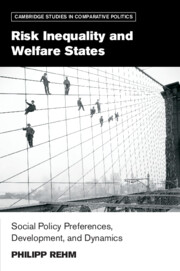Book contents
- Frontmatter
- Dedication
- Contents
- List of Figures
- List of Tables
- Acknowledgments
- 1 Introduction
- 2 Theoretical Framework
- 3 Preference Formation
- 4 Risk Perceptions
- 5 Risk Pools and Social Policy Generosity
- 6 Risk Pools and Retrenchment – German Reunification
- 7 Risk Pools and Social Policy Adoption
- 8 Crises and Social Policy
- 9 Conclusion
- References
- Index
- Other Books in the Series
2 - Theoretical Framework
Published online by Cambridge University Press: 05 May 2016
- Frontmatter
- Dedication
- Contents
- List of Figures
- List of Tables
- Acknowledgments
- 1 Introduction
- 2 Theoretical Framework
- 3 Preference Formation
- 4 Risk Perceptions
- 5 Risk Pools and Social Policy Generosity
- 6 Risk Pools and Retrenchment – German Reunification
- 7 Risk Pools and Social Policy Adoption
- 8 Crises and Social Policy
- 9 Conclusion
- References
- Index
- Other Books in the Series
Summary
In rich democracies, about one-fifth of government expenditure goes to the main state prerogatives – general public services (including debt service), defense, public order, and safety. About one-half goes toward social policy narrowly defined – social protection and health. And more than three-fifths (almost two-thirds) is allocated to social policy more broadly defined – social protection, health, and education (OECD 2011, tables 5.1 and 5.3). In other words, government expenditures on welfare functions dwarf those on night-watchman functions. In all rich democracies, governments force their citizens to be part of mandatory social insurance systems covering all main risks. Taxing their citizens and spending huge amounts of money on social policy are the main activities of governments today.
It is inconceivable that, in democracies, the single most prominent government activity – social policy – can be performed without widespread support by citizens. Yet, the potential importance of public opinion for social policy making has largely been neglected. Clem Brooks and Jeff Manza, who have perhaps most systematically addressed this shortcoming, argue that existing accounts are “reaching for, but not grasping, public opinion”: “Analysts within multiple theoretical traditions have anticipated the possibility that mass opinion is a factor relevant to shaping social policymaking, and perhaps in accounting for differences between countries. But none of these scholars has taken the next steps of explicitly theorizing and attempting to measure its policy impact” (Brooks and Manza 2007, 25–26). Analyzing the potential policy impact of public opinion – as in the seminal work by Clem Brooks and Jeff Manza – is a step in the right direction, but it begs the important question: why does popular support for social policy differ across space and time? We have to turn to the individual level to explore this topic.
Despite its shared focus on democracies, the welfare state literature has, for the longest time, paid very little attention to citizen preferences. Only recently have scholars investigated the topic, but existing studies typically exclusively concentrate on the micro-level. A joint perspective of micro-level determinants of social policy preferences and the latter's impact on social policy making has yet to be conducted. It is such a perspective that I develop in this chapter.
- Type
- Chapter
- Information
- Risk Inequality and Welfare StatesSocial Policy Preferences, Development, and Dynamics, pp. 12 - 36Publisher: Cambridge University PressPrint publication year: 2016



